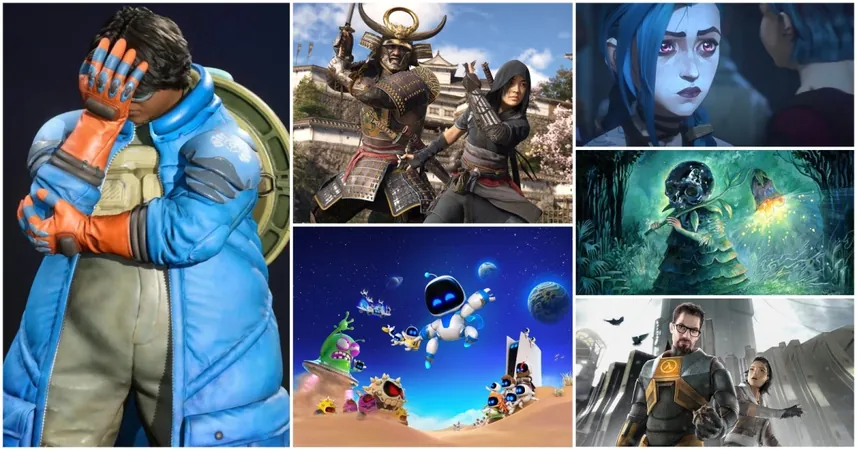
The Gaming Industry 2024: An Unforgettable Year of Triumphs and Trials
2024-12-27
Author: Ying
Industry-Wide Layoffs: A Grim Reality
As we plunge into the landscape of 2024, one of the most disheartening trends has been the prevalence of layoffs across the gaming sector. This troubling issue, which began in 2023, has persisted and intensified, leading to the loss of thousands of jobs. Major players like Microsoft initiated the wave by slashing 10,000 jobs, and soon, studios worldwide followed suit, each citing reasons linked to the COVID-19 pandemic’s aftermath.
Over the past year, the number of gaming professionals terminated exceeded that of 2023, with estimates suggesting a staggering total of 14,600 by year-end—a stark increase from the previous year's figures. Renowned studios such as Activision Blizzard, EA, Ubisoft, and Riot Games faced substantial downsizing, sparking widespread discussions around potential future trends in the industry. Speculation looms that the layoffs may continue into 2025, bringing further uncertainty to the gaming workforce.
Humans vs. AI: The Fierce Struggle
The rise of generative artificial intelligence has been a double-edged sword for the gaming industry. With a significant push from investors and tech giants since mid-2022, AI's rapid integration into creative processes has ignited passionate backlash. From protests on platforms like ArtStation in late 2022 to larger-scale public outcries in 2024, opinion has divided around this transformative technology.
Company decisions, like Adobe's inclusion of generative AI tools in their software and Autodesk's controversial AI for 3D modeling, have led to outcry from vocal segments of the gaming and digital art communities. While some companies pushed for AI's adoption, others—such as Nintendo and Riot Games—reinforced their commitment to human creators, acknowledging the importance of preserving artistic integrity.
2024 also marked the advent of significant anti-AI legislation, as political circles began to take notice of the growing discontent. Key highlights include the rise of platforms designed to protect artists from unauthorized AI replication, illustrating an ongoing battle between human creativity and machine learning.
The Rise of Indie Games vs. AAA Studios
In the realm of game development, the performance of AAA titles has been dismal compared to the surging success of indie games. While many high-budget games such as *Skull and Bones* and *Diablo IV: Vessel of Hatred* failed to captivate audiences, indies thrived with creative blockbuster hits. Titles like *Balatro*, a quirky poker-themed roguelike, sold over 3.5 million copies, astounding the community and garnering a solid spot in the Game of the Year conversation.
Statistically, indie games accounted for 58% of all sales on Steam in 2024, a notable rise from 49% in 2023. With the revitalization of creative storytelling and gameplay mechanics, smaller studios have sent a strong message to AAA developers: there's still room for innovation and impact in a saturated market.
Ubisoft's Fall from Grace: A Case Study
Among the studios experiencing trouble, Ubisoft stands out for its particularly tumultuous year. Once adored for franchises like *Assassin's Creed* and *Far Cry*, the company faced multiple controversies that led to a massive decline in public goodwill. Poor sales across titles like *Prince of Persia: The Lost Crown* and the incessantly delayed *Skull and Bones* led to a drastic 20% drop in comparative revenue.
What's more, poorly received comments from executives about consumer ownership rights fueled existing frustration, and musings about launching multiple Assassin's Creed titles seemed tone-deaf amidst the chaos. As Ubisoft struggles to regain footing, the future remains uncertain, caught between potential recovery efforts and ongoing critiques from a disillusioned audience.
Denuvo: The Anti-hero of the Year
As if 2024 didn’t have enough drama, the presence of controversial Digital Rights Management (DRM) software, Denuvo, became a focal point of criticism. Game developers began shedding Denuvo from their titles as a strategy to appease disgruntled fans. In a particularly memorable incident, Warhorse Studios' *Kingdom Come: Deliverance II* faced turmoil over rumors of Denuvo’s inclusion, leading fans to publicly cancel pre-orders until clear information disavowed its presence.
Denuvo's reputation plummeted further, faced with backlash and memes poking fun at its inefficacy against piracy. As developers continue to navigate the stormyw waters of anti-piracy technology, Denuvo’s future hangs precariously in the balance.
Asian Developers Rise
On a brighter note, 2024 blossomed with the emergence of numerous Asian-developed games gaining traction and acclaim in Western markets. Notable releases like *Black Myth: Wukong* and *Like a Dragon: Infinite Wealth* resonated well with global audiences, showcasing the remarkable talent and creativity prevalent in Asian game development.
The Game Awards 2024: A Historic Celebration
A fitting climax to the year was **The Game Awards 2024**, which shattered viewership records and offered a platform for showcasing the year’s highlights. Featuring fewer interruptions and more award recognitions, the event captivated audiences worldwide, even amid critical conversations about its voting mechanics.
The introduction of new contenders, alongside existing franchises, sparked deep discussions among gamers about what constitutes excellence in gaming. While magical moments stood tall, the presence of less-received entries such as *Catly* triggered louder conversations about vetting processes for industry awards.
As we reflect on this eventful 2024 in gaming—the challenges, accolades, and eye-watering controversies—the industry has proven yet again its ability to captivate and confound in equal measure. Here’s to hoping 2025 brings more triumphs and positive changes!



 Brasil (PT)
Brasil (PT)
 Canada (EN)
Canada (EN)
 Chile (ES)
Chile (ES)
 España (ES)
España (ES)
 France (FR)
France (FR)
 Hong Kong (EN)
Hong Kong (EN)
 Italia (IT)
Italia (IT)
 日本 (JA)
日本 (JA)
 Magyarország (HU)
Magyarország (HU)
 Norge (NO)
Norge (NO)
 Polska (PL)
Polska (PL)
 Schweiz (DE)
Schweiz (DE)
 Singapore (EN)
Singapore (EN)
 Sverige (SV)
Sverige (SV)
 Suomi (FI)
Suomi (FI)
 Türkiye (TR)
Türkiye (TR)